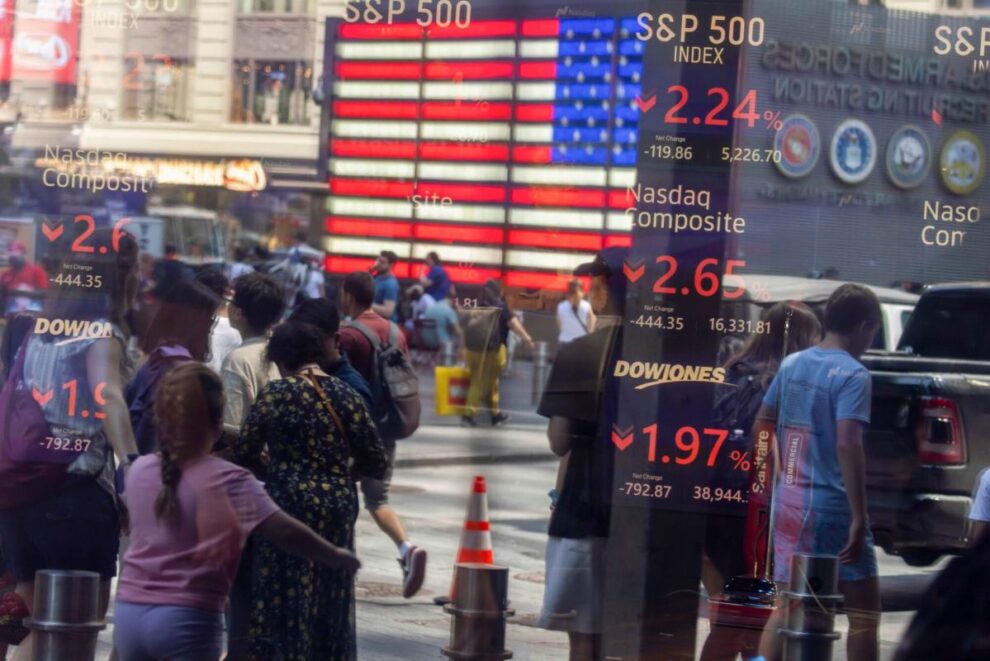
(Bloomberg) — Investors and analysts are lining up bets on battered Asian technology stocks, after a $279 billion rout in Nvidia Corp. fueled a wave of selling in chip stocks.
Most Read from Bloomberg
Shares of Asian semiconductor and equipment makers including SK Hynix Inc., Taiwan Semiconductor Manufacturing Co. and Advantest Corp. fell amid a widespread market rout, creating a crunch moment for investors who have benefited from big gains in chip stocks over the past few years.
The VIX Index, known as Wall Street’s “fear gauge,” spiked on Tuesday, and there are more sources of potential volatility to come this week. They include the US jobs report on Friday, which will be closely watched by investors worried that a potential slowdown in the US economy could have a knock-on effect on chip suppliers in Asia.
Read: Chipmakers Drag Asian Stocks Lower on Renewed AI Valuation Worry
Here is what investors and analysts said:
Jung In Yun, chief executive officer at Fibonacci Asset Management Global Pte. in Singapore
“Although we expect the volatility spike to revisit more often for some time in the future, we maintain our view that each selloff is a buying opportunity. In this regard, we expect to see the broad equity market in Asia rising very quickly, once again,” he said. “The concern for peak in demand for AI is exaggerated in our view. We will likely see the demand for AI as well as its supporting infrastructure remaining robust throughout the first half of next year.”
Investors should “look for stocks that have not enjoyed the rally despite its connection with AI” such as Samsung Electronics Co., Yun added.
Andrew Jackson, a strategist at Ortus Advisors Pte. in Singapore
“It feels a bit like a storm in a tea cup after August. It feels like we are not getting a repeat of the intense panic selling like last time,” he said. Jackson added that he would buy Micronics Japan Co. and Advantest. on declines as they have little to no exposure to China.
Charu Chanana, head of FX strategy at Saxo Markets in Singapore
“The September curse comes together with memories of an early August selloff that came on the back of jobs report. And we have another jobs report coming this week, so traders are taking risk off the table for now,” she said.
“I would be rather cautious here,” she added.
Randy Abrams, head of Taiwan research at UBS Global Asset Management in Taipei
“Now investors are starting to question if the ROI is coming through. They are a bit nervous when they see some of the macro data is not as strong. So there is a question whether the music keeps playing, whether the cloud investment is still there.”
Soft data points are driving skittishness in AI stocks, but “the reality we see from supply chain and the hyperscalers is that they will continue to spend,” and that’s why investors bought the dip a few weeks ago, he said.
An Hyungjin, chief executive officer at Billionfold Asset Management Inc. in Seoul
“It doesn’t seem to be an opportunity to dip buy tech stocks,” An said. “Because South Korean industries are dependent on the US economy, worries about its economic slowdown cannot but touch off market jitters.”
Investors should find relative safety in the Korean companies that depend on domestic demand than those relying on US exports.
Dayeon Hong, a multi-asset portfolio manager at Shinhan Asset Management Co. in Seoul
“Stock markets have rebounded quickly after declining sharply in August so what we see today is partly a reversal of that rebound,” she said. “As the market volatility could increase on Friday, investors are preemptively moving to defensive positions.”
Kohei Onishi, a senior investment strategist at Mitsubishi UFJ Morgan Stanley Securities Co. in Tokyo
“Today’s fall is just a reaction to big drop in New York shares overnight. Given that the US market had been rising, the decline of this size is not a surprise,” he said. “We have lots of events in the run-up to the FOMC on Sept 17-18 and markets will likely be range-bound this month. But once uncertainties around those events are cleared, we are likely to see a rally in share prices toward the end of year.”
–With assistance from Abhishek Vishnoi, Annabelle Droulers and Hideyuki Sano.
Most Read from Bloomberg Businessweek
©2024 Bloomberg L.P.








